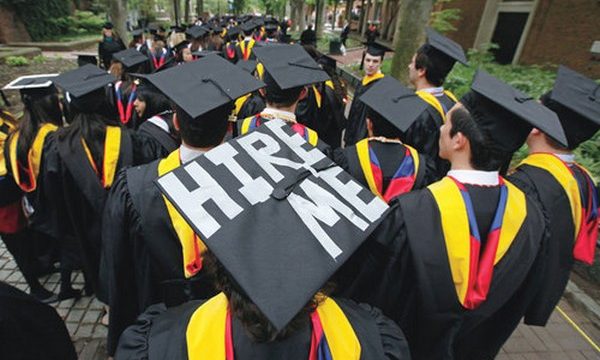Half Of College Graduates Working Jobs That Don't Require Degrees

I graduated from high school a little over ten years ago, and what I remember of my discussions with teachers and guidance counselors about my career was that college was a necessity. Without it, I’d be doomed to a career of flipping burgers, but with it I’d slide easily into the path to prosperity.
Of course, it’s all a bit more complicated than that, but teachers and counselors are still dishing out that advice according to more recent graduates I’ve spoken to. And it’s not doing us any good. Just look at the surplus of college graduates we’ve created:
Nearly half of grads from four-year colleges are working in jobs that don’t require a four-year degree. A striking sub-fact: grads from public universities are 11% more likely to feel overqualified than those who went to private schools. I would have thought it would be the other way around. The study cites a Bureau of Labor Statistics number that underlines the McKinsey findings: 48% of employed U.S. college grads are in jobs that require less than a four-year degree.
Even more chilling than those numbers is a figure I read some time ago that I can’t get out of my head: In 2011, 1.5 million, or 53.6% of college grads under age 25 were out of work or underemployed, according to a 2012 Associated Press story that used an analysis of the U.S. government’s 2011 Current Population Survey data by Northeastern University researchers, plus material from Drexel University economist Paul Harrington, and analysis from liberal Washington, D.C. think tank, the Economic Policy Institute.
Meanwhile, enrollments have surged over the last 25 years along with the cost of higher education and administrative bloat:
“Over the last 25 years, the universities’ enrollments have collectively grown by 26 percent, while the ranks of full-time administrators have risen 75 percent, not only at private universities but also at some public ones,” the center reports. “During the same 25-year period, tuition at four-year universities nationwide has increased an inflation-adjusted 85 percent, federal figures show.
In other words, the nation’s students are paying more to get something that’s worth less. Meanwhile, the universities selling the degrees have grown positively decadent with lavish campuses, huge pay increases and eyebrow-raising growth in administration.
If that all sounds like the housing bubble, that’s exactly what it is. Home prices soared, even as the glut of homes om the market made them worth less, while the bankers made out like bandits.
But then, the higher education bubble like the housing bubble before it are what happens when the government sets out to promote things like housing or a college education by essentially turning them into an entitlement. A college education had a lot more value when it was something to be earned, before our colleges were turned into assembly lines for harvesting all the government-backed student loans and grants that come attached to the students.
In related news, “Overdue student loans hit an all-time high”







